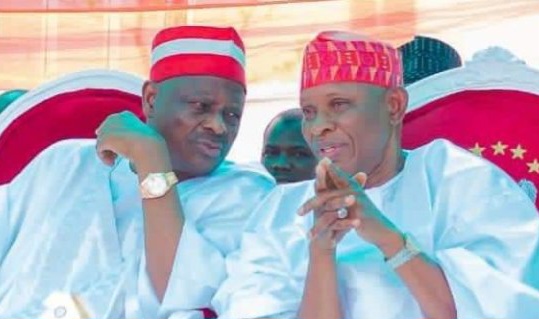Tensions are reaching new heights within Kano’s ruling New Nigeria Peoples Party (NNPP) as Governor Abba Yusuf distances himself from his political mentor, Senator Rabiu Kwankwaso.
Refusing to attend key meetings or take Kwankwaso’s calls, Yusuf seems to be heeding a growing local movement urging him to “stand on his own feet” and break free from his godfather’s influence.
The “Abba Tsaya da Kafarka” campaign — meaning “Abba, stand firm” — has gained traction both within and outside the party, calling for Yusuf to assert his independence.
Sources reveal that this campaign is backed by some NNPP officials who are in talks with the ruling APC, possibly setting the stage for Yusuf’s departure from Kwankwaso’s sphere of control.
In a significant development, an Abia State High Court recently issued an order reinstating former NNPP leader Boniface Aniebonam, a move seen as part of a strategic plan to weaken Kwankwaso’s hold on the party. This legal maneuver is viewed by observers as a step toward fracturing the NNPP and paving the way for Yusuf’s possible alignment with the APC.
Leading the charge against Kwankwaso are notable figures within Yusuf’s administration, including Secretary to the State Government Baffa Bichi, Transport Commissioner Mohammed Diggol, and Education Commissioner Umar Doguwa. Additional supporters include Senator Kawu Sumaila and multiple federal representatives and state assembly members.
Reports indicate that Yusuf’s desire for autonomy has long been building, fueled by Kwankwaso’s deep involvement in local government affairs. Tensions reportedly flared in March when Kwankwaso unilaterally appointed caretaker chairmen for local governments without consulting Yusuf. This rift widened in September, as Yusuf dismissed the Kwankwaso-backed chairmen shortly after the state assembly had extended their terms at Kwankwaso’s behest.
In recent weeks, despite Kwankwaso’s efforts to maintain influence, Yusuf has continued to distance himself. When Kwankwaso attempted to arrange a meeting in Kano, Yusuf did not attend, leaving his mentor waiting through the night. The cold shoulder continued in Abuja, where Kwankwaso flew in for a meeting that Yusuf ultimately skipped, signaling a complete breakdown in communication.
Kwankwaso’s attempts to reach out through intermediaries, including the governor’s aides, also went unanswered. He even directed Yusuf to dismiss Bichi, the SSG and a key figure in the independence movement, yet Yusuf held firm. In response, NNPP Chairman Hashimu Dungurawa announced the removal of Bichi and the Transport Commissioner, accusing them of anti-party activities.
Meanwhile, NNPP lawmakers have begun abandoning the Kwankwasiyya movement. On Sunday, Representative Ali Madaki, a prominent Kano politician, publicly renounced the movement, urging his supporters to stop wearing the iconic red caps. He pledged allegiance to Yusuf and encouraged the governor to assert his independence. This sentiment was echoed by other representatives, indicating a larger shift within the NNPP.
With only three members of the Kano State House of Assembly staying loyal to Kwankwaso, the “Tsaya da Kafarka” movement is reshaping Kano’s political landscape. Loyalists argue that while Kwankwaso’s sacrifices for Yusuf’s political rise are undeniable, Yusuf’s bid for autonomy may set a new course for the NNPP in Kano.
Neither Kwankwaso nor Yusuf’s spokespersons have commented on the situation. However, political watchers believe that the outcome of this rift could define Kano’s political scene for years to come.




